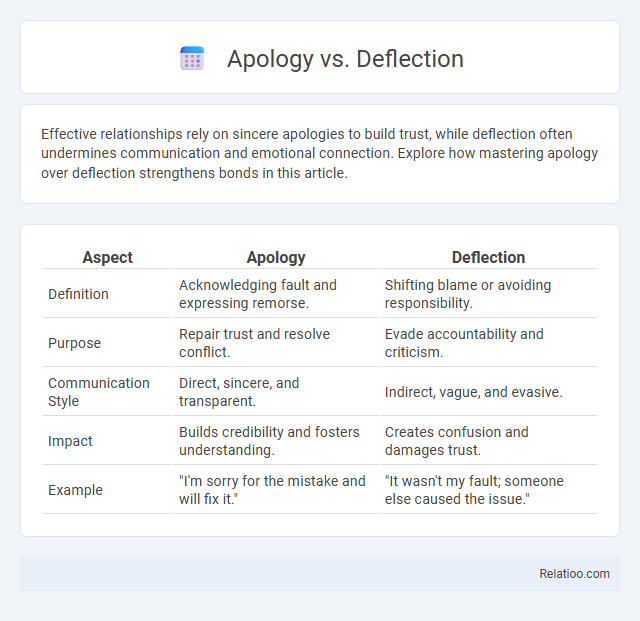Effective relationships rely on sincere apologies to build trust, while deflection often undermines communication and emotional connection. Explore how mastering apology over deflection strengthens bonds in this article.
Table of Comparison
| Aspect | Apology | Deflection |
|---|---|---|
| Definition | Acknowledging fault and expressing remorse. | Shifting blame or avoiding responsibility. |
| Purpose | Repair trust and resolve conflict. | Evade accountability and criticism. |
| Communication Style | Direct, sincere, and transparent. | Indirect, vague, and evasive. |
| Impact | Builds credibility and fosters understanding. | Creates confusion and damages trust. |
| Example | "I'm sorry for the mistake and will fix it." | "It wasn't my fault; someone else caused the issue." |
Understanding Apology: Definition and Importance
Understanding an apology involves recognizing it as a sincere acknowledgment of wrongdoing and expression of remorse, which is essential for repairing trust and fostering healthy communication. Apologies differ from deflections, which involve shifting blame or avoiding responsibility, often damaging relationships by undermining accountability. Your ability to offer genuine apologies rather than deflections strengthens personal connections and promotes emotional healing.
What is Deflection? Key Characteristics
Deflection is a communication tactic where an individual avoids taking responsibility by shifting attention away from their actions or mistakes towards another topic or person. Key characteristics of deflection include evading direct answers, minimizing personal accountability, and redirecting the conversation to external factors or blame. Unlike an apology, which admits fault, deflection undermines clarity and resolution by obscuring the core issue.
Psychological Roots of Apologizing vs Deflecting
Apologizing often stems from empathy and a recognition of personal accountability, rooted in a desire to repair social bonds and reduce conflict. Deflection typically arises from psychological defense mechanisms such as denial or avoidance, serving to protect one's self-esteem by shifting blame or responsibility away from oneself. Understanding these differing psychological motivations highlights how apologies foster trust and growth, while deflections can hinder communication and perpetuate misunderstandings.
Social Impacts: Response to Apology vs Deflection
Apologies foster trust and promote conflict resolution by acknowledging responsibility and validating emotions, leading to stronger social bonds. Deflections, which evade accountability by shifting blame or minimizing issues, often escalate misunderstandings and diminish credibility. Repeated use of deflection undermines relationships and impedes effective communication in social settings.
Apology in Conflict Resolution
Apology plays a crucial role in conflict resolution by acknowledging responsibility and expressing genuine remorse, which helps to rebuild trust and facilitate emotional healing between parties. Unlike deflection, which shifts blame or avoids accountability, a sincere apology promotes open communication and paves the way for collaborative problem-solving. Effective apologies often include clear statements of regret, acceptance of fault, and a commitment to change, making them essential for resolving conflicts constructively.
Deflection as a Defense Mechanism
Deflection as a defense mechanism involves shifting focus away from personal responsibility to avoid uncomfortable emotions or criticism, often by redirecting blame onto others. Unlike an apology, which acknowledges fault and promotes accountability, or simple deflection that avoids the issue, this psychological strategy protects self-esteem by minimizing perceived threats to self-image. Frequent use of deflection can hinder emotional growth and damage interpersonal trust by preventing honest communication and resolution.
Consequences of Apologizing vs Deflecting
Apologizing fosters trust and accountability, strengthening relationships and promoting emotional healing, while deflecting often damages credibility and escalates conflicts by avoiding responsibility. When you choose to apologize sincerely, it encourages open communication and mutual respect, whereas deflecting can lead to misunderstandings and decreased cooperation. The consequences of apologizing versus deflecting significantly impact your personal and professional connections, influencing long-term outcomes and reputation.
Recognizing Genuine Apologies vs Tactical Deflection
Recognizing genuine apologies involves identifying sincere acknowledgment of wrongdoing and a commitment to make amends, whereas tactical deflection shifts responsibility away from the offender without admitting fault. You can distinguish a true apology by its specificity, empathy, and accountability, while deflection often includes vague statements or blaming external factors to avoid consequences. Understanding these differences enhances your ability to navigate conflicts and foster authentic communication.
Strategies to Foster Accountability over Deflection
Fostering accountability over deflection requires embracing transparency and taking full responsibility for your actions without shifting blame. Strategies include active listening, acknowledging mistakes explicitly, and committing to corrective actions while maintaining open communication channels. Cultivating a culture where apologies are sincere and followed by tangible changes helps overcome deflection and strengthens trust within any relationship or organization.
Building Trust: The Role of Apology vs Deflection
Apology plays a crucial role in building trust by acknowledging mistakes and demonstrating accountability, which fosters reliability and respect in relationships. Deflection undermines trust as it avoids responsibility and shifts blame, leaving Your credibility damaged and creating emotional distance. Embracing authentic apologies helps repair trust more effectively than deflection, promoting open communication and long-term connection.

Infographic: Apology vs Deflection
 relatioo.com
relatioo.com